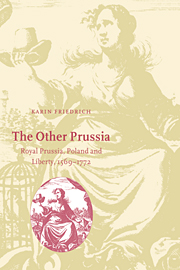Book contents
- Frontmatter
- Contents
- Preface
- Gazetteer
- Glossary
- List of abbreviations
- Map 1
- Map 2
- 1 Introduction
- 2 The origins of Royal Prussia
- 3 Royal Prussia and urban life in the Polish-Lithuanian Commonwealth
- 4 History, myth and historical identity
- 5 Political identity in the cities of Royal Prussia and the meaning of liberty (1650–1720)
- 6 Loyalty in times of war
- 7 Divergence: the construction of rival Prussian identities
- 8 Centre versus province: the Royal Prussian cities during the Great Northern War
- 9 Myths old and new: the Royal Prussian Enlightenment
- 10 Conclusion
- Bibliography
- Index
- CAMBRIDGE STUDIES IN EARLY MODERN HISTORY
8 - Centre versus province: the Royal Prussian cities during the Great Northern War
Published online by Cambridge University Press: 22 September 2009
- Frontmatter
- Contents
- Preface
- Gazetteer
- Glossary
- List of abbreviations
- Map 1
- Map 2
- 1 Introduction
- 2 The origins of Royal Prussia
- 3 Royal Prussia and urban life in the Polish-Lithuanian Commonwealth
- 4 History, myth and historical identity
- 5 Political identity in the cities of Royal Prussia and the meaning of liberty (1650–1720)
- 6 Loyalty in times of war
- 7 Divergence: the construction of rival Prussian identities
- 8 Centre versus province: the Royal Prussian cities during the Great Northern War
- 9 Myths old and new: the Royal Prussian Enlightenment
- 10 Conclusion
- Bibliography
- Index
- CAMBRIDGE STUDIES IN EARLY MODERN HISTORY
Summary
In 1701, while the courts of Berlin and Königsberg were busy preparing the coronation festivities, other rulers in Northern Europe had more serious matters to attend to. In 1697, the accession to the Swedish throne of fifteen-year-old Charles XII (1697–1718) aroused the interest of his neighbours in rethinking the balance of power in the Baltic. Denmark, under Frederick IV (1699–1730), aimed at the recovery of territories lost in wars with Sweden between 1643 and 1660; Russia, under Peter I (1682–1725), was equally keen to weaken Sweden's influence and gain access to the Baltic. In Poland-Lithuania, Frederick August, Elector of Saxony, had emerged victorious in the race for the Polish crown in 1697, after converting to Catholicism and outstripping the French candidate, François Louis de Bourbon, Prince of Conti. High hopes were attached to the new monarch, whose powerful presence gained him the name Augustus the Strong, and whose political ambitions, combined with the wealth and prosperity of Saxony, seemed to provide the Commonwealth with a welcome boost of strength after the lacklustre ending of John Sobieski's reign. In his coronation oath, Augustus promised to recover Livonia, and in particular the city of Riga, for the Commonwealth. In the autumn of 1698, after a meeting with Peter in Rawa, Augustus concluded an anti-Swedish alliance with Denmark.
- Type
- Chapter
- Information
- The Other PrussiaRoyal Prussia, Poland and Liberty, 1569–1772, pp. 171 - 188Publisher: Cambridge University PressPrint publication year: 2000



